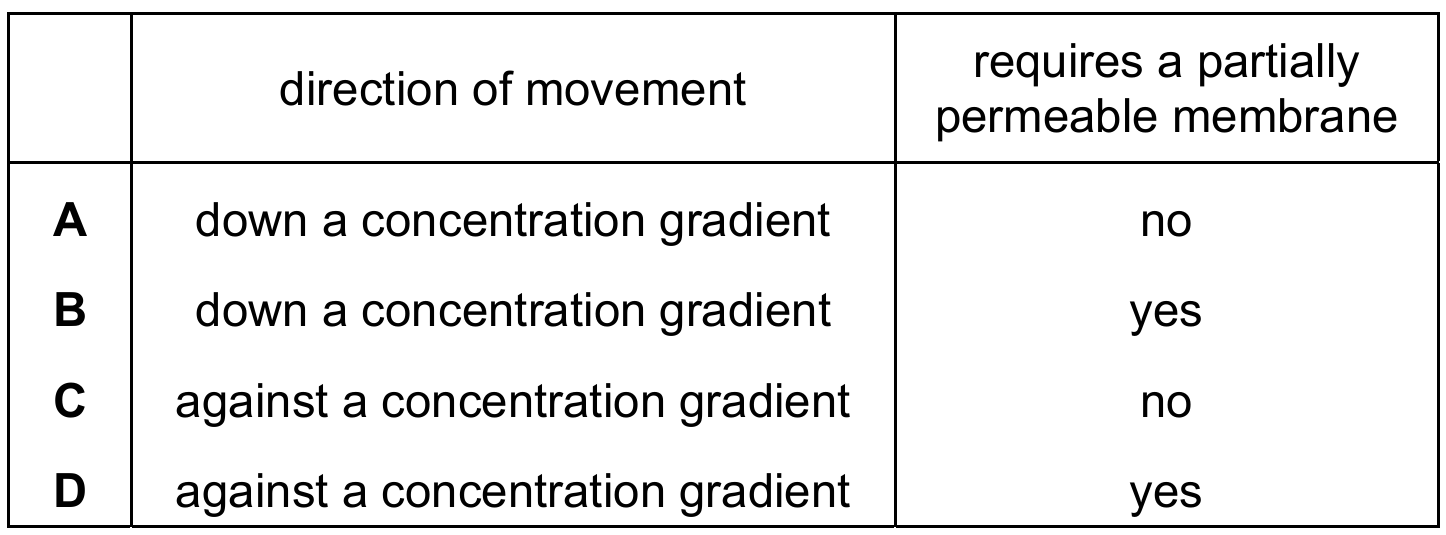Question
A student made the following statements about the movement of ions by active transport.
1. It is the net movement of particles from a low concentration to a high concentration.
2. It is the net movement of particles from a high concentration to a low concentration.
3. It requires the use of energy from respiration.
4. It can only take place in living cells.
2. It is the net movement of particles from a high concentration to a low concentration.
3. It requires the use of energy from respiration.
4. It can only take place in living cells.
Which statements are correct?
(A) 1, 3 and 4
(B) 1 and 4 only
(C) 2 and 4
(D) 2 only
(B) 1 and 4 only
(C) 2 and 4
(D) 2 only
▶️ Answer/Explanation
Active transport is the process of moving substances against a concentration gradient, specifically from an area of low concentration to high concentration (Statement 1). Unlike passive diffusion, this process is “uphill” and requires energy, which is provided in the form of ATP generated during cellular respiration (Statement 3). Because it relies on metabolic energy and specialized carrier proteins embedded in the membrane, it can only occur in living cells (Statement 4). Statement 2 is incorrect as it describes passive transport or diffusion. Therefore, statements 1, 3, and 4 are the correct descriptors.
✅ Answer: (A)
✅ Answer: (A)
Question
Three processes are listed.
- $1$ Molecules or ions are moved across membranes.
- $2$ Molecules or ions are moved by protein carriers.
- $3$ Ions are taken up by root hairs.
Which processes can involve active transport?
(A) $1$, $2$ and $3$
(B) $1$ and $2$ only
(C) $1$ and $3$ only
(D) $2$ and $3$ only
(B) $1$ and $2$ only
(C) $1$ and $3$ only
(D) $2$ and $3$ only
▶️ Answer/Explanation
Active transport is the movement of substances against a concentration gradient using energy from respiration. Statement $1$ is correct because active transport specifically moves solutes across biological membranes. Statement $2$ is correct because this process requires specific protein carriers (pumps) to transport molecules. Statement $3$ is a classic biological example, as root hair cells use active transport to absorb mineral ions from the soil where they are in low concentration. Since all three statements accurately describe or exemplify active transport, option (A) is the correct choice.
✅ Answer: (A)
✅ Answer: (A)
Question
Which row shows correct statements about active transport?

▶️ Answer/Explanation
Active transport is the process by which substances move from an area of lower concentration to an area of higher concentration, which is defined as moving against a concentration gradient. This process requires energy (ATP) and specific carrier proteins embedded within a partially permeable membrane to pump the molecules across. Unlike simple diffusion, which can occur in open space, active transport is a cellular process that must occur across a biological membrane. Therefore, row D correctly identifies both the direction of movement and the necessity of a membrane.
✅ Answer: (D)
✅ Answer: (D)
